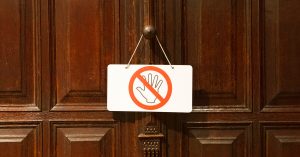“Community Association Q&A: Improper Closed Board Meeting?” – Naples Daily News
 Q: My entire condominium board met in a closed session to conduct an annual review for the employees. I requested the right to attend these reviews as I wanted to speak favorably on behalf of one of the employees. My request was denied. Did I have the legal right to attend? D.T.
Q: My entire condominium board met in a closed session to conduct an annual review for the employees. I requested the right to attend these reviews as I wanted to speak favorably on behalf of one of the employees. My request was denied. Did I have the legal right to attend? D.T.
A: No. A board meeting occurs when there is a quorum of the board and they are discussing association business. Under Florida law, the only way a board meeting can be properly “closed” is if they meet one of two exceptions outlined in the Florida Condominium Act.
The first exception allows a closed board meeting if the board is discussing “personnel matters,” which would include an employee’s annual review. The second exception allows a closed board meeting when the board is discussing “proposed or pending litigation” and the association attorney is present (in person or via the phone/video-conference).
Based on the foregoing, the board acted within the confines of the law when it refused your attendance at the employees’ annual reviews. I would suggest you put your favorable comments about the subject employee in writing so the board is aware.
Q: I serve on my condominium board, and we are updating our official records retention policy. I seem to recall the law changed recently regarding how long certain official records must be maintained. Can you explain what that change was? T.B.
A: The portion of the Florida Condominium Act which addresses how long certain official records must be maintained was changed in 2018. One of the more noteworthy changes pertains to meeting minutes. The new law confirms that the minutes of all meetings of the association, the board of administration, and the unit owners must be permanently maintained from the inception of the association.
The prior version of the law only required these minutes to be maintained for seven years. Another noteworthy change pertains to electronic voting records. The new law clarifies that electronic records relating to voting by unit owners must be maintained in the official records for one year from the date of the election, vote or meeting to which the document relates.
To read the original article, please click here.
David Muller is a Board-Certified Attorney in Condominium and Planned Development Law with Becker & Poliakoff, P.A. in Naples. Send questions to dmuller@beckerlawyers.com.





